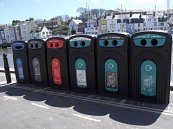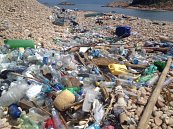Our Plastic World: Policy and Legislation
Published on 02 April 2017
This is the third piece in a three-part series about recycling and the efforts of the” Plasticity Forum”:http://www.plasticityforum.com.
By now, you likely know a thing or two about Plasticity Forum. As plastic pollution continues, thinkers and entrepreneurs are grouping together to seek an end to one of human’s greatest dilemmas and to create new means for tidying up the planet.
Two weeks ago, we introduced you to the notions of economy and how plastic is recovered. Then, we talked about plastic’s design, and now, we’ll focus on legislation and policy. The time has come to examine what rules (if any) exist to stop plastic pollution from spreading across the globe….
Our Plastic World: Designed for Reuse, But Often Tossed Aside
Published on 25 March 2017
Last week, we introduced you to the Plasticity Forum, an organization that works to bring designers, innovators, economists and all-around thinkers to the table to discuss plastic pollution and what should be done about it. Economy and recovery were our previous topics. This week, we’ll examine plastic design and how it’s being used for more environmentally friendly missions.
Pre-Designed for Recyclability
As mentioned in part one, plastic is an inexpensive material that allows manufacturers to safely package their products while saving money. Nothing wrong with putting cheap materials to good use, except our lack of recycling efforts have led to some nasty repercussions, especially when one considers where plastic comes from.
Plasticity Forums Return to the U.S. This Spring
Published on 23 March 2017
With growing focus on plastic pollution and the challenges it presents, the Plasticity Forum brings together motivated, like-minded experts from across the plastics spectrum to discuss the opportunities that can result as solutions are introduced. Plasticity convenes leaders to share information, network, and primarily discuss best practices about scalable, innovative solutions to reduce the waste footprint left by plastics in our communities and environment. It attracts high-level participants from brand owners, plastics product makers, NGOs, resin and biomaterial suppliers, educators, designers, recyclers, consultants and more.
Our Plastic World: Promoting Sustainability Through a Circular Economy
Published on 17 March 2017
This is the first piece in a three-part series about recycling and the efforts of the Plasticity Forum.
Plastic is everywhere: in our homes, our offices, our schools – we can’t seem to get away from it. Even products not made of plastic are usually wrapped in it.
It isn’t all bad. Plastic is a cheap material that allows manufacturers to package merchandise with ease while saving money. Lower costs mean companies can charge less. This stimulates spending and keeps our economy healthy. But recycling is also economically feasible, and we’re just not doing it enough.
SPE Announces New Forums to Be Held in Conjunction with ANTEC® 2017
Published on 01 March 2017
Plasticity Event Draws Recyclers and Designers
Published on 15 November 2016
Plasticity London – Designers are arguably one of the missing links to solving some of the complex solutions related to plastic pollution – designing for recycling, and societal process flow in terms of resource recovery. Those who know the issues will be better able to drive expansion of the corporate social responsibility (CSR) and UN sustainable development goals (SDGs) that many of the brands and clients they work for are striving to meet.
Plastic Waste crisis unites designers and plastics experts at London forum
Published on 22 September 2016
The Plasticity Forum in London included a unique range of global expert speakers on the topic of plastic sustainability, with challenges and opportunities that included the manufacturing needs for an innovative single-material shampoo bottle, the use of calcium carbonate from large volumes of egg shells as a filler for any types of polymers which can benefit from its inclusion. Giulio Bonazzi, chairman and CEO of Italy’s Aquafil Group, spoke about his firm’s unique fiber recycling capacities from carpet tiles and used fishing nets. Aquafil has a growing program with carpet maker Interface, which sources fishing nets from local communities in the Philippines and Cameron. Mr. Bonazzi, and Miriam Turner from Interface said that “over 100 tons of nets have been collected, with over 55,000 families impacted by a cleaner environment, and over 600 families now having access to micro finance as a result of the Net-Works program.”
Designers are the Key to Plastic Pollution Solutions
Published on 20 September 2016
Plasticity is positioned as part of the London Design Festival because often the design community is not involved with sustainability discussions, options and opportunities. As a result, they may not realize all of the issues and complexities which are associated with plastic vis-à-vis materials, processes and recycled content. Entrepreneurs, innovators and designers will be part of Plasticity, one of the biggest sustainability events of the LDF.
Held most recently this past spring in Shanghai, the event brings together experts from across the plastics spectrum to discuss innovation and the dynamics of scaling processes, materials and recycling to reduce waste and create value.
Designing for the Future - Plastic and the Circular Economy
Published on 29 August 2016
Don’t miss speakers from IDEO, HP, Accenture, the Ellen MacArthur Foundation, Just Egg and many more, all experts on plastic sustainability, without the footprint.
Plasticity London "Designing for the Future - Plastic and Circularity"
Published on 28 August 2016
The aim of Plasticity Forum London 2016 is to recognize the value that plastics bring to society, while also embracing both sustainability and the circular economy. The event will offer “a big conversation on the future of plastic,” and discuss where opportunities can be created related to recycled content, resource recovery, job creation and waste reduction.











